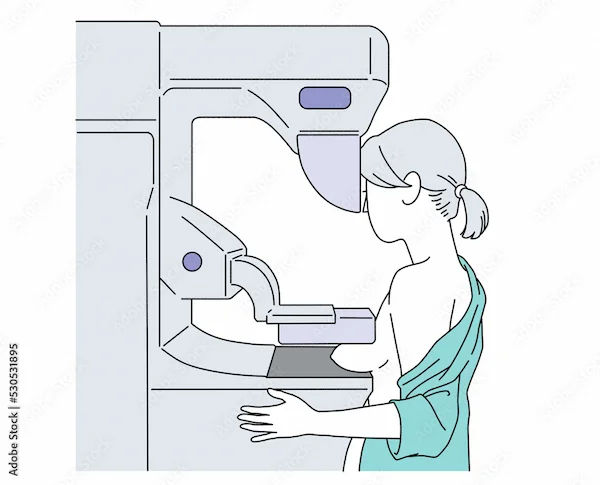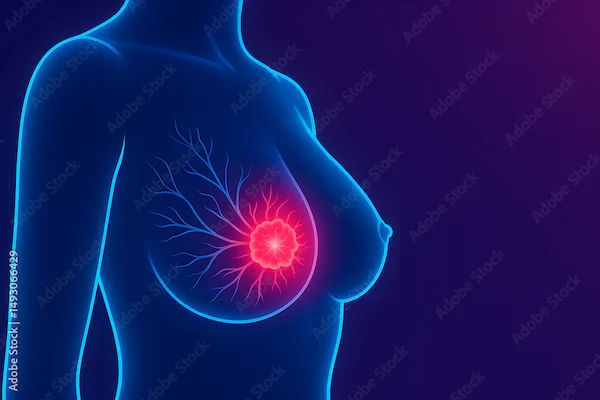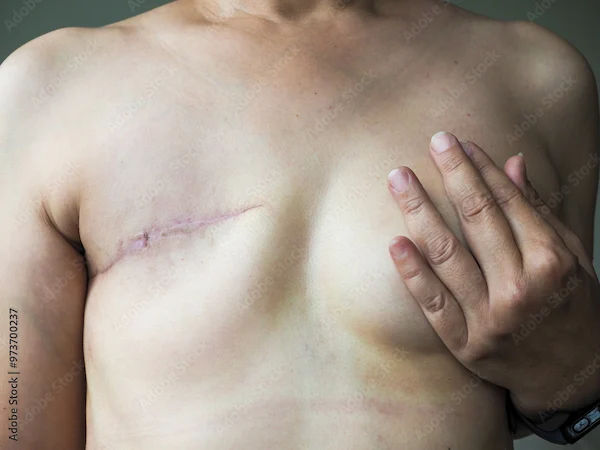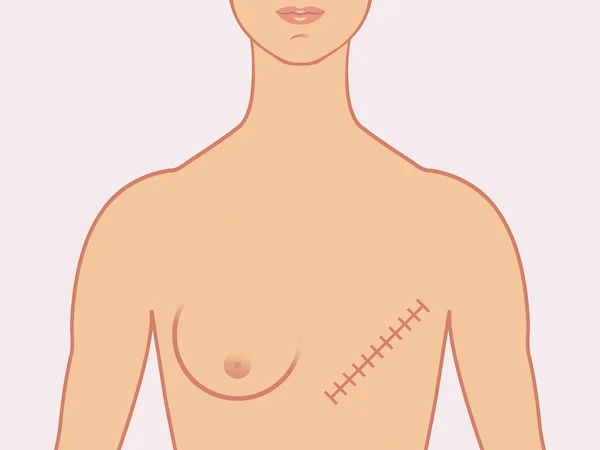All You Need To Know About Breast Cancer Surgery
Understanding breast cancer and its surgical intervention and Learning about its types, procedures, benefits and risks, its clinical implications, recovery and outcome.

Written by Dr. Sonia Bhatt
Last updated on 3rd Jul, 2025
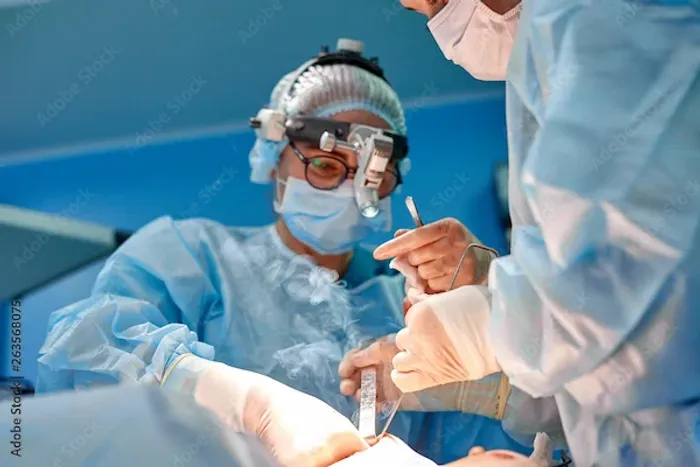
Introduction
Breast cancer develops in the breast tissue when abnormal cells proliferate uncontrollably, forming tumours. The appropriate treatment varies based on the type of breast cancer and the individual's overall health, and may include surgery, chemotherapy, hormone therapy, or radiotherapy.
When breast cancer spreads to other areas of the body, it is known as secondary breast cancer. This form of cancer is one of the most common among women, with approximately 80% of cases being invasive, indicating that the cancer can extend beyond the breast. Although it primarily affects women over 50, younger women and men can also be diagnosed with breast cancer. Regular screenings and understanding risk factors are vital for early detection and improved treatment outcomes.
Common types of Breast cancer
Healthcare providers categorise breast cancer into types and subtypes to tailor treatments for maximum effectiveness and minimal side effects. Common types include:
Invasive ductal carcinoma (IDC): The most prevalent type, originating in the milk ducts and spreading to nearby tissue.
Lobular breast cancer: Begins in the milk-producing glands and frequently spreads to surrounding tissue.
Ductal carcinoma in situ (DCIS): Starts in the milk ducts but remains contained and does not invade surrounding tissue.
Less common types include:
Triple-negative breast cancer (TNBC): An aggressive form that tends to spread rapidly.
Inflammatory breast cancer (IBC): A rare, fast-growing type that may appear as a rash.
Paget’s disease of the breast: Affects the skin of the nipple and represents less than 4% of breast cancer cases.
Breast cancer typically arises in the milk ducts or lobules. The earliest stage, known as in situ, is not life-threatening. Invasive forms can metastasise to lymph nodes or other organs, which can be serious.
Overview of Breast Cancer Surgery
Surgery is typically the primary treatment for all breast cancer stages, except advanced metastatic cases, which require systemic therapies like chemotherapy or radiotherapy. Most women diagnosed with breast cancer will undergo surgery as part of their treatment, tailored to their individual circumstances. Key reasons for surgery include:
Removing the cancer: This can involve breast-conserving surgery or a mastectomy.
Evaluating cancer spread: Techniques like sentinel lymph node biopsy assess whether cancer has reached the lymph nodes.
Restoring breast shape: Reconstruction can enhance appearance post-surgery.
Relieving symptoms: Surgery may alleviate discomfort in advanced cases.
Factors influencing the choice of surgery include the cancer's size and location, previous treatments, overall health, and personal preferences. Your doctor will provide recommendations based on your specific situation, and it's important to discuss your options thoroughly.
Types of Breast Cancer Surgery
Breast cancer treatment typically begins with surgery, which may include:
Breast-Conserving Surgery (Lumpectomy): Removes the tumour and a margin of healthy tissue, suitable for early-stage cancer.
Mastectomy: Involves the complete removal of one or both breasts.
Lymph Node Surgery: Includes sentinel lymph node biopsy or axillary dissection to check for cancer spread.
After a mastectomy, breast reconstruction may restore the breast’s shape using implants or tissue from another part of the body.
Other surgical options include:
Sentinel Node Biopsy: Removal of a few lymph nodes for examination.
Lymphadenectomy: Removal of a larger number of lymph nodes to assess cancer spread.
Options for Women with DCIS or Operable Breast Cancer
Women with ductal carcinoma in situ (DCIS) or operable breast cancers typically have three surgical options:
Lumpectomy: Removes the cancerous area and surrounding tissue, usually followed by radiation therapy to reduce recurrence risk.
Mastectomy:
Total Mastectomy: Removes the entire breast, potentially including lymph nodes.
Modified Radical Mastectomy: Removes the entire breast and most lymph nodes under the arm, though rarely performed for DCIS.
Mastectomy with Reconstruction: Performed either during the mastectomy or later, using implants or tissue. The surgeon may also recreate the nipple and apply a tattoo for the areola.
Preparing for Breast Cancer Surgery
After being diagnosed with breast cancer, your healthcare provider will discuss your surgical options based on your health and the cancer stage. Before your operation, you'll attend a pre-assessment clinic to prepare. The surgery is performed under general anaesthesia, meaning you will be unconscious and feel no pain during the procedure. Many patients can go home the same day or the following day. However, if you have breast reconstruction, you may need to stay in hospital for 2 to 7 days. After the surgery, you may have a wound drain in place, which can remain while you recover at home. Your nurse will provide written instructions for its care.
The Surgical Procedure of breast
Your breast cancer surgery will be customised to meet your specific needs, based on discussions with your healthcare team. The surgeon will aim to remove any tissue that could harbour cancer cells, which might involve excising part or all of your breast, or even both breasts. Additionally, some or all of the axillary (underarm) lymph nodes next to the affected breast may be removed.
If you choose to have breast reconstruction, the surgeon may start or complete this procedure during the same operation. This could require extra incisions if tissue is taken from another part of your body for the reconstruction. Alternatively, you might decide to postpone reconstruction until after your cancer treatment.
The duration of the surgery will depend on the type and complexity of the procedure. Typically, a simple lumpectomy, with or without sentinel node biopsy, lasts about one to two hours. Conversely, a mastectomy with axillary lymph node dissection or simultaneous breast reconstruction may take three to four hours. You might need to stay in hospital for one or more nights afterward.
Risks and Complications and Post-Surgery Recovery
All surgical procedures have associated risks, and breast cancer surgery is no exception. It's important to remember that the main purpose of the surgery is to remove potentially life-threatening cancer, and the advantages typically outweigh the risks involved. Surgery carries various risks and complications, including:
Wound Infection: Watch for fever, redness, or warmth.
Blood Clots: Seek help for painful leg swelling, chest pain, or breathing issues.
Seroma: Fluid may accumulate, usually resolving on its own but can be drained if needed.
Hematoma: Blood may collect around the wound, causing pain and swelling; drainage might be required.
Numbness/Tingling: Nerve damage may cause discomfort; usually heals in weeks.
Shoulder Stiffness: Limited motion can occur; exercises may help.
Cording: Tight bands of tissue may develop; massage can relieve symptoms.
Lymphedema: Persistent swelling in the arm or hand can occur, manageable but not curable.
Impact on Quality of Life
Dealing with breast cancer can be quite challenging, and you may have days when you feel particularly overwhelmed. Here are some tips to help you care for yourself during your diagnosis and treatment:
Prioritise rest: The effects of breast cancer and its treatment can be tiring. It's essential to take breaks when you need to, rather than waiting for a more convenient time.
Focus on nutrition: Your appetite may fluctuate during treatment, so try to maintain a balanced diet rich in fruits, vegetables, lean proteins, and whole grains to support your health.
Reduce stress: The stress associated with a cancer diagnosis can be significant. Engaging in regular physical activity, such as walking or participating in exercise classes, can be beneficial for managing stress.
Seek support: Consult your healthcare provider about survivorship programmes that can help you navigate the challenges of living with breast cancer.
Reconstruction Options after Surgery
If you are scheduled for a mastectomy, you will typically have the option for breast reconstruction. If you choose to have reconstruction, it may be feasible to perform it at the same time as the mastectomy. In such cases, your breast surgeon may discuss different types of mastectomy with you, such as:
Skin-sparing mastectomy: This method involves removing the breast and nipple while keeping most of the surrounding skin intact.
Nipple-sparing mastectomy: This approach removes all breast tissue but preserves much of the overlying skin and the nipple area.
Advances and Research in Breast Cancer Surgery
Surgeons are improving breast cancer surgery through various steps such as:
Shorter treatment times: Immediate breast reconstruction allows for simultaneous mastectomy and reconstruction, while lumpectomy with accelerated partial breast irradiation can complete both surgery and radiation in under two weeks.
Enhanced appearance: Oncoplastic surgery combines effective cancer treatment with techniques that maintain a natural breast appearance, including lumpectomies with lifts or reductions.
Better pain management: Strategies such as using non-narcotic pain relief before surgery, long-acting anaesthetics at the surgical site, and supportive therapies during recovery reduce the need for strong pain medication.
Reduced lymphedema risk: Pre-surgery chemotherapy and hormone therapies can lessen the need for extensive lymph node removal, while sentinel node biopsies and axillary lymph node mapping help identify crucial nodes for lymph drainage.
Conclusion
Surgery is a vital aspect of the treatment plan for almost all types and stages of breast cancer. Whether the objective is to remove a tumour, check for any remaining cancer cells, or reconstruct the breast shape afterward, you will work closely with your surgeon throughout your treatment. You will engage in detailed discussions about your options and preferences to ensure that your goals for breast cancer surgery are achieved.
Consult Top Oncologist
Consult Top Oncologist

Dr Devashish Tripathi
Radiation Specialist Oncologist
20 Years • MBBS, PLAB, MRCP (UK)- General Medicine, FRCR (Oncology), Certificate of Completion of Training (CCT)- Clinical Oncology
Delhi
Apollo Hospitals Indraprastha, Delhi

Dr. Gopal Kumar
Head, Neck and Thyroid Cancer Surgeon
15 Years • MBBS, MS , FARHNS ( Seoul, South Korea ), FGOLF ( MSKCC, New York )
Delhi
Apollo Hospitals Indraprastha, Delhi
(25+ Patients)

Dr. Gopal Kumar
Head, Neck and Thyroid Cancer Surgeon
15 Years • MBBS, MS , FARHNS ( Seoul, South Korea ), FGOLF ( MSKCC, New York )
Noida
Apollo Hospitals Sector 26, Noida

Dr. Vishal Choksi
Head and Neck Surgical Oncologist
20 Years • American Head & Neck Society (AHNS) certified from Memorial Sloan-Kettering Cancer Centre, American Board of Surgery (ABS) certified general surgeon, MBBS (India)
Ahmedabad
Apollo Hospitals Gandhinagar, Ahmedabad
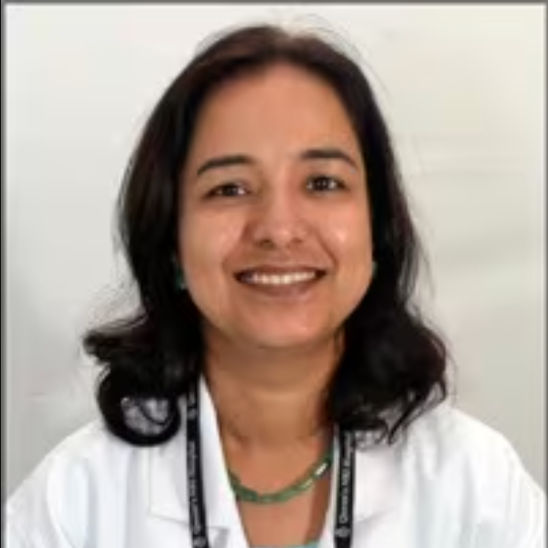
Dr Sunita Samleti
Oncologist
18 Years • M.D. (Pathology)- TN Medical College, Mumbai University, Mumbai, Mar 2005 M.B.B.S. Grant Medical College, Mumbai University, Mumbai, Oct 1999
Chinagadila
Apollo Hospitals Health City Unit, Chinagadila

